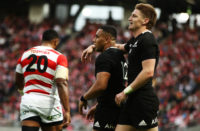 Just about a fortnight ago, the warring Welsh factions were ‘miles away' from ending their stand-off. Now that the smoke of conflict has lifted, they are still miles away – 40 to be exact. Twelve months of wrangling, long enough to question their Union's fitness to govern, left the most passionate of European rugby countries in dire need of reassurance that they were reunited again as one. What they got was depressing evidence that the two parties cannot stand the sight of each other.
Just about a fortnight ago, the warring Welsh factions were ‘miles away' from ending their stand-off. Now that the smoke of conflict has lifted, they are still miles away – 40 to be exact. Twelve months of wrangling, long enough to question their Union's fitness to govern, left the most passionate of European rugby countries in dire need of reassurance that they were reunited again as one. What they got was depressing evidence that the two parties cannot stand the sight of each other.
What Union apologists acclaimed as ‘Peace In Our Time' ought to have been an occasion, if not for back-slapping bonhomie, then at the very least for the main protagonists gathering round the negotiating table for the ritual handshake.
It ought to have been a parish-pump version of Bill Clinton's 1993 scene on the White House lawn when the Israeli Prime Minister Yitzhak Rabin symbolised another peace deal alongside the PLO leader Yasser Arafat.
Instead the Union did their own thing at the Millennium Stadium late on Thursday afternoon – a one-man show featuring their often elusive chief executive Roger Lewis.
The regions held their news conference almost 24 hours later, 40 miles west along the M4 in Swansea at the Liberty Stadium. There may be a peace deal of sorts but the bad blood is there for everyone to see.
Lewis, whom the regions repeatedly identified as the stumbling block to an early settlement, could not resist the temptation to score cheap political points.
“We have retained our dignity,” he said, implying that the regions had lost theirs.
And that in the context of the most preposterous claim of all. “There has never been a raised voice,” Lewis told BBC Radio Wales. “There has never been a cross word.”
To ask the Welsh public to believe that is to insult their intelligence.
Of course there have been raised voices. Of course there have been cross words and why ever not when one side wants what the other is not prepared to give and vice versa?
So the regions, driven into a corner by a Union attempting to bully them into submission, responded by playing a pivotal role in the clubs wrestling control of the European Cup from the Unions.
No raised voices over such a momentous change of the landscape? No cross words. Please.
Had there been no raised voices and no cross words, then perhaps Mr Lewis might explain why the whole sorry business was allowed to drag on for so long, dragging the good name of Welsh rugby in its wake.
Why was it allowed to damage Welsh rugby's reputation at home and abroad and damage it badly enough for as revered a figure as Gerald Davies to resign from the WRU board in protest at the leadership, or, more pointedly, the lack of it?
Other more pertinent questions have now been raised. How can there be a lasting peace when the mutual mistrust runs so deep, especially among the regions, that the two sides cannot bring themselves to stage manage a front of unity?
On top of that the long-suffering Welsh public are afflicted by more tripe, as in ‘Gatland's Law.'
In attempting to justify their policy of signing top internationals on dual contracts, the Union has resurrected a topic which ought to have been left unearthed as an impractical deterrent to prevent Welsh internationals decamping for France and England, that any 50-50 selection call would go in favour of the home-based player.
It was never applied because Gatland was never going to enforce a so-called law which weakened his team. Ironically, the one player who suffered, Dwayne Peel, did so despite the head coach absolving him from any punishment because his move, from the Scarlets to Sale, had been negotiated before any warnings of dire consequences.
Peel was hardly picked again not because he was playing in Manchester but because the Wales management considered him past it. While England have taken a stand on not picking French-based players, Wales simply cannot afford to do so which reduces ‘Gatland's Law' to so much baloney. Those who subscribe to the Union view that a pot of £3.3m will keep their best players in Wales are conveniently ignoring the facts of life. If Gatland succeeds in adding nine players to Sam Warburton, the average salary will work out at £330,000.
Why would someone like Leigh Halfpenny stay in Wales for that when he can earn some £200,000 more in Toulon with every chance of winning the European Cup and French championship to boot?
When they had to make a choice between joining the Union or staying loyal to their regions, Alun-Wyn Jones, Rhys Priestland and Scott Williams chose to stay put in Ospreylia and Scarletville.
As recent events have shown, a WRU contract is not always a WRU contract. Ask Adam Jones…
*This article was first published in The Rugby Paper on August 31.



























